The Next Page
Are you curious about the power of international cooperation? And how it affects our future? Tune in to the #NextPagePod, the podcast of the UN Library & Archives Geneva, designed to advance the conversation on multilateralism.
Are you curious about the power of international cooperation? And how it affects our future? Tune in to the #NextPagePod, the podcast of the UN Library & Archives Geneva, designed to advance the conversation on multilateralism.
Episodes
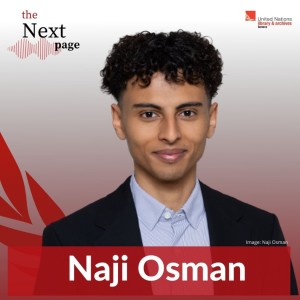
Friday May 13, 2022
Naji Osman on youth, the UN, and building an inclusive multilateralism
Friday May 13, 2022
Friday May 13, 2022
According to statistics from the United Nations, our world is home to 1.8 billion young people between the ages of 10 to 24, the largest generation of young people in recorded history. What is the role of youth in today’s multilateralism, as we look to the challenges we face in our present and our future?
In this episode, we are joined by Naji Osman, who in 2021 was designated as one of the three Swiss Youth Delegates to the United Nations. Naji is a student and research assistant in the Department of Economics at the University of Zurich, and is actively engaged in global political affairs, economic development and human rights.
Today he speaks with our Director Francesco Pisano, about his views on inclusive engagement, in particular, youth participation in multilateralism and how we can build intergenerational synergy to really make an impact as a global community.
Resources
Transcript: https://libraryresources.unog.ch/audio/transcripts/Naji-Osman-on-youth-the-UN-and-building-an-inclusive-multilateralism
Learn more about the Office of the UN Secretary’s General’s Envoy on Youth: https://www.un.org/youthenvoy/
Find statistics on youth from across the UN system: https://www.un.org/youthenvoy/youth-statistics/
Where to listen to this episode
Apple podcasts: https://podcasts.apple.com/us/podcast/the-next-page/id1469021154
Spotify: https://open.spotify.com/show/10fp8ROoVdve0el88KyFLy
Youtube:
Content
Speakers: Naji Osman, Francesco Pisano
Host: Natalie Alexander
Editor & Producer: Yunshi (Daisy) Liang
Social media designs: Yunshi (Daisy) Liang & Natalie Alexander
Recorded & produced at the United Nations Library & Archives Geneva
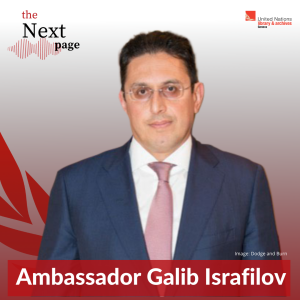
Friday Apr 29, 2022
Friday Apr 29, 2022
This episode of the #NextPagePod continues our series of conversations with Ambassadors to the United Nations Geneva, where we explore their experiences as diplomats in a multilateral system, and what the UN means for their countries today as we look to the multilateralism we need for our future.
Our Director at the UN Library & Archives Geneva, Francesco Pisano, is joined by the Permanent Representative and Ambassador of the Republic of Azerbaijan to the UN in Geneva, Galib Israfilov.
In March 1992, Azerbaijan joined the United Nations. With this year marking 30 years of accession, Ambassador Israfilov shares some of the history of the nation, its regional role today, and his own reflections on the importance of multilateralism from his experiences as both a bilateral and multilateral diplomat.
Resources
Transcript: https://libraryresources.unog.ch/audio/transcripts/Ambassador-Israfilov-on-Azerbaijan-and-enriching-multilateralism
Follow the Permanent Mission of the Republic of Azerbaijan to the UN Geneva on Twitter: https://twitter.com/azmissiongeneva and Ambassador Galib Israfilov: https://twitter.com/galib_is
Where to listen to this episode
Apple podcasts: https://podcasts.apple.com/us/podcast/the-next-page/id1469021154
Spotify: https://open.spotify.com/show/10fp8ROoVdve0el88KyFLy
Youtube: https://youtu.be/QvRMvSgVnys
Content
Speakers: Ambassador Galib Ifralov, Francesco Pisano
Host: Natalie Alexander
Editors & Producers: Yunshi (Daisy) Liang & Natalie Alexander
Social media designs: Yunshi (Daisy) Liang & Natalie Alexander
Image of Galib Ifralov: Dodge and Burn
Recorded & produced at the United Nations Library & Archives Geneva
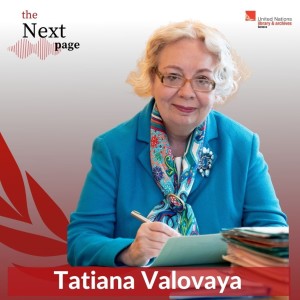
Sunday Apr 24, 2022
Sunday Apr 24, 2022
Today on the #NextPagePod we release a bonus episode to mark the International Day of Multilateralism and Diplomacy for Peace, established in 2018 by the UN General Assembly, and observed each year on 24 April.
At the heart of our podcast is the aim to enrich and promote understanding of the values of multilateralism and international cooperation. To mark this day, our Director at the Library & Archives, Francesco Pisano, speaks with the Director-General of UN Geneva, Tatiana Valovaya.
#MultileralismDay #MultilateralismMatters
Resources
Transcript
Learn more about "Our Common Agenda", an agenda of action designed to accelerate the implementationof existing agreements: https://www.un.org/en/content/common-agenda-report/
Find out more about UN Geneva: https://www.ungeneva.org/en and Director-General Tatiana Valovaya: https://www.ungeneva.org/en/director-general
Where to listen to this episode
Apple podcasts: https://podcasts.apple.com/us/podcast/the-next-page/id1469021154
Spotify: https://open.spotify.com/show/10fp8ROoVdve0el88KyFLy
Youtube: https://youtu.be/jyGtsFtB42Q
UN Library & Archives
Facebook: https://www.facebook.com/UNOGLibrary
Twitter: https://twitter.com/UNOGLibrary
Content
Speakers: Director-General of UN Geneva Tatiana Valovaya, Francesco Pisano
Host: Natalie Alexander
Editor & Producer: Natalie Alexander
Transcript: Yunshi (Daisy) Liang
Social Media Designs: Natalie Alexander
Image of the Director-General: UN Photo / Jean Marc Ferré
Produced at the United Nations Library & Archives Geneva
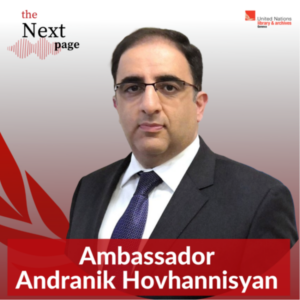
Thursday Apr 14, 2022
Thursday Apr 14, 2022
This episode continues our series of conversations with Ambassadors to the United Nations Geneva, where we explore their views as diplomats in a multilateral system and what the UN means for them today.
Our Director at the UN Library & Archives Geneva, Francesco Pisano, is joined by the Permanent Representative and Ambassador of the Republic of Armenia to the UN in Geneva, Andranik Hovhannisyan.
This year, 2022, Armenia marks 30 years of accession to the United Nations. Ambassador Hovhannisyan shares how he came to serve in diplomacy, as well as moments from Armenia’s history that have marked him the most. He also shares his view on Armenia’s experience with the multilateralism at the UN, and as a historian himself, his thoughts as multilateralism evolves in a changing world.
Resources
Transcript: https://libraryresources.unog.ch/audio/transcripts/Armenia-multilateralism
Follow the Permanent Mission of the Republic of Armenia to the UN Geneva on Twitter: https://twitter.com/Armembsuisse
Where to listen to this episode
Apple podcasts: https://podcasts.apple.com/us/podcast/the-next-page/id1469021154
Spotify: https://open.spotify.com/show/10fp8ROoVdve0el88KyFLy
Youtube: https://youtu.be/VeVBSekEclw
Content
Speakers: Ambassador Andranik Hovhannisyan, Francesco Pisano
Host: Natalie Alexander
Editors & Producers: Yunsi (Daisy) Liang & Natalie Alexander
Social media designs: Natalie Alexander
Image of Ambassador Hovhannisyan: Permanent Mission of Armenia to the UN in Geneva
Recorded & produced at the United Nations Library & Archives Geneva
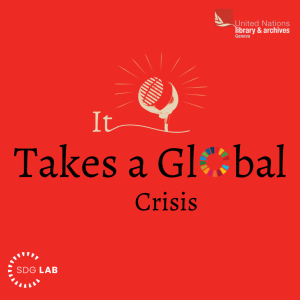
Friday Apr 01, 2022
It Takes A Global Crisis: Episode 4 - Sustainable Cities
Friday Apr 01, 2022
Friday Apr 01, 2022
Welcome to Episode 4 of 'It Takes a Global Crisis', a series of four special episodes produced by the UN Library & Archives Geneva in collaboration with the SDG Lab. In this last episode, we explore sustainable cities.
According to the United Nations, about 2 out of every 3 people will be living in cities or urban centres by 2050. Did it take a global crisis like the pandemic to highlight what we need for the future of cities? To ensure safe, livable, sustainable spaces? Let’s find out, as our host Edward Mishaud speaks with Dr. Agata Krause, Head of the 2030 Agenda and International Relations at the Center for Sustainable Development, Trondheim Kommune in Norway, and Dr. Bernadia Irawati Tjandradewi, the Secretary General of United Cities and Local Governments Asia-Pacific.
Resources
Transcript: https://libraryresources.unog.ch/audio/transcripts/It-Takes-A-Global-Crisis-Episode-4-Sustainable-Cities
Find out more about the Center for Sustainable Development with Trondheim Kommune in Norway: https://twitter.com/LearningSociTRD?s=20&t=u3INxevAMmIkrFVC3TcgtA
Find out more about United Cities and Local Governments Asia-Pacific: https://uclg-aspac.org/en/
Learn more about the C40 Students Reinventing Cities competition: https://www.c40reinventingcities.org/en/students/
Where to listen to this episode
Apple podcasts: https://podcasts.apple.com/us/podcast/the-next-page/id1469021154
Spotify: https://open.spotify.com/show/10fp8ROoVdve0el88KyFLy
YouTube: https://youtu.be/iJGrFQrGleEUN Library & Archives
Facebook: https://www.facebook.com/UNOGLibrary
Twitter: https://twitter.com/UNOGLibrary
SDG Lab
Twitter: https://twitter.com/SDGLab
LinkedIn: https://www.linkedin.com/company/sdg-lab/
SDG Lab website: About SDG Lab — SDG Lab
Content
Speakers: Dr. Bernadia Irawati Tjandradewi & Dr. Agata Krause
Host: Edward Mishaud
Editors: Yunshi (Daisy) Liang & Natalie Alexander
Social Media: Yunshi (Daisy) Liang & Natalie Alexander
Production: Natalie Alexander, Edward Mishaud, Marlène Borlant, Evgeniya Altukhova, Tiffany Verga, Yunshi (Daisy) Liang.
Social media image: Wirestock.
Produced at the UN Library & Archives Geneva

Friday Mar 18, 2022
Friday Mar 18, 2022
Alors que les dégâts causés par les guerres et les conflits sont indubitablement dévastateurs, les tentatives de destruction du patrimoine culturel revêtent une valeur symbolique forte. Puissant outil identitaire et unificateur, la culture est fréquemment instrumentalisée lors de conflits armés pour diviser les communautés. Quel rôle peut alors jouer le multilatéralisme pour la sauvegarde du patrimoine culturel ?
Dans cet épisode, nous accueillons Lazare Eloundou Assomo, Directeur du Centre du patrimoine mondial à l’UNESCO et ancien Directeur de l’Entité «Culture et situations d’urgence», pour discuter de cette question. Véritable homme de terrain, il partage son expérience au Mali, où il a mené la reconstruction des mausolées de Tombouctou, et souligne le besoin de mener des actions de terrain pour être au plus près des communautés affectées par les conflits. Enfin, il nous rappelle que la protection du patrimoine culturel est un enjeu de paix et de sécurité global, et nous présente les instruments législatifs et technologiques nécessaires à sa préservation.
Nous vous invitons donc à écouter cet épisode passionnant qui, nous l’espérons, vous rappellera le rôle crucial joué par la culture pour l’ensemble des communautés. Bonne écoute.
Ressources:
Transcription : https://libraryresources.unog.ch/audio/transcripts/Le-multilateralisme-et-la-sauvegarde-du-patrimoine-culturel
La culture dans les situations d’urgence : https://fr.unesco.org/themes/culture-situations-durgence
Fonds d’urgence pour le patrimoine : https://fr.unesco.org/themes/protecting-our-heritage-and-fostering-creativity/Fonds-d%E2%80%99urgence-pour-le-patrimoine
Initiative Faire revivre l’esprit de Mossoul : https://en.unesco.org/fieldoffice/baghdad/revivemosul Initiative Li Beirut : https://fr.unesco.org/fieldoffice/beirut/libeirut
Convention de La Haye de 1954 pour la protection des biens culturels en cas de conflit armé : http://www.unesco.org/new/fr/culture/themes/armed-conflict-and-heritage/convention-and-protocols/1954-hague-convention/ Accord UNESCO-UNITAR (UNOSAT) : https://unitar.org/about/news-stories/news/unesco-and-unitar-unosat-team-protect-cultural-heritage-latest-geo-spatial-technologies
Où trouver cet épisode
Apple podcasts: https://podcasts.apple.com/us/podcast/the-next-page/id1469021154
Spotify: https://open.spotify.com/show/10fp8ROoVdve0el88KyFLy
YouTube: https://youtu.be/tApSxgttHJw
La Bibliothèque et Archives des Nations unies à Genève
Facebook: https://www.facebook.com/UNOGLibrary
Twitter: https://twitter.com/UNOGLibrary
Contenu :
Intervenant: Lazare Eloundou Assomo
Animatrice: Kelly Le Normand
Réalisation et montage: Natalie Alexander & Kelly le Normand
Transcription: Yunshi (Daisy) Liang et Maria Bolotnikov
Enregistré et produit à la Bibliothèque & Archives des Nations Unies à Genève

Friday Mar 04, 2022
It Takes a Global Crisis: Episode 3 - Social Protection
Friday Mar 04, 2022
Friday Mar 04, 2022
Welcome to Episode 3 of 'It Takes a Global Crisis', a series of four special episodes produced by the UN Library & Archives Geneva in collaboration with the SDG Lab. In this episode, we explore social protection.
Host Edward Mishaud is joined by Christina Behrendt, Head of the Social Policy Unit at the International Labour Organization, and Dr. Kate Philip, Programme Lead for the Presidential Employment Stimulus in South Africa.
The COVID-19 pandemic has put social protection in the spotlight, inviting us to reflect on social protection policy not only in times of crisis but also in everyday life. What exactly is social protection? What have we learned from countries’ policy responses to the crisis? How does a robust social protection system contribute to individual, community and collective wellbeing? And what can we learn in order to strengthen these systems for future events?
Did it take a global crisis to highlight the critical and multi-dimensional role of social protection? Let’s find out.
Resources
Transcript: https://libraryresources.unog.ch/audio/transcripts/It-Takes-A-Global-Crisis-Episode-3-Social-Protection
Find out more about Christina Behrendt, Head of the Social Policy Unit at the International Labour Organization. Follow her on Twitter https://twitter.com/csbehrendt
Find out more about the International Labour Organization’s Work in social protection: https://www.ilo.org/global/topics/social-security/lang--en/index.htm
ILO. 2021. World Social Protection Report 2020–22: Social Protection at the Crossroads – in Pursuit of a Better Future: https://www.ilo.org/wcmsp5/groups/public/@dgreports/@dcomm/@publ/documents/publication/wcms_817572.pdf
Resources on social protection and the COVID-19 crisis: ILO | Social Protection Platform (social-protection.org)
Find out more about the Presidential Employment Stimulus in South Africa: https://pres-employment.openup.org.za/img/Presidential%20Employment%20Stimulus%20Review%20and%20Introduction%20to%20Phase%202.pdf
Visit the ESCAP Social Protection Toolbox: www.socialprotection-toolbox.org
Where to listen to this episode
Apple podcasts: https://podcasts.apple.com/us/podcast/the-next-page/id1469021154
Spotify: https://open.spotify.com/show/10fp8ROoVdve0el88KyFLy
YouTube: https://youtu.be/U8Hwo9PjGqE
UN Library & Archives
Facebook: https://www.facebook.com/UNOGLibrary
Twitter: https://twitter.com/UNOGLibrary
SDG Lab
Twitter: https://twitter.com/SDGLab
LinkedIn: https://www.linkedin.com/company/sdg-lab/
SDG Lab website: About SDG Lab — SDG Lab
Content
Speakers: Christina Behrendt & Kate Philip
Host: Edward Mishaud
Editors: Yunshi (Daisy) Liang & Natalie Alexander
Social Media: Natalie Alexander
Production: Natalie Alexander, Edward Mishaud, Marlène Borlant, Evgeniya Altukhova, Tiffany Verga, Yunshi (Daisy) Liang.
Social media image: https://www.freepik.com/photos/business. Business photo created by fabrikasimf - www.freepik.com
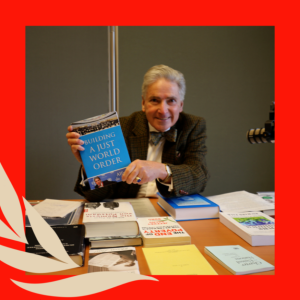
Friday Feb 18, 2022
Building A Just World Order, with Dr. Alfred de Zayas
Friday Feb 18, 2022
Friday Feb 18, 2022
In this episode, the #NextPagePod welcomes Dr. Alfred de Zayas, the first person to serve as the UN Human Rights Council's Independent Expert on the Promotion of a Democratic and Equitable International Order, a role he assumed from May 2012 to April 2018.
Dr. de Zayas has a background in history and law, with expertise in civil and political rights. He completed his Juris Doctor at Harvard, and his doctorate in history from the University of Göttingen in Germany. Among his many roles, his latest is as a Professor at the Geneva School of Diplomacy and International Relations.
He joins host Tiffany Verga to share his latest book, Building a Just World Order. What does this mean and why should it matter as we reflect on the future of multilateralism? He shares his experiences as an Independent Expert, which led to 14 reports which he presented to the UN Human Rights Council and the General Assembly. These reports are compiled in his new book, together with 25 principles of international order for the UN system, which he recommends as holistic and interconnected ways for moving forward to ensure peace, human rights and sustainable development for all.
We also hear why he continues to have hope in multilateralism.
Resources
Transcript: The Next Page - Transcripts - Audio Guide - Research Guides at United Nations Library & Archives Geneva (unog.ch)
Find out more about Dr. Alfred de Zayas at his Human Rights Corner website: https://dezayasalfred.wordpress.com/
Find out more about his book, Building A Just World Order: https://www.claritypress.com/product/building-a-just-world-order/
Where to listen to this episode
Apple podcasts: https://podcasts.apple.com/us/podcast/the-next-page/id1469021154
Spotify: https://open.spotify.com/show/10fp8ROoVdve0el88KyFLy
Youtube: https://youtu.be/7H_AH97E2z4
UN Library & Archives
Facebook: https://www.facebook.com/UNOGLibrary
Twitter: https://twitter.com/UNOGLibrary
Content
Speaker: Dr. Alfred de Zayas
Host: Tiffany Verga
Editor & Producer: Natalie Alexander
Social Media & Transcript: Natalie Alexander & Yunshi (Daisy) Liang
Produced at the United Nations Library & Archives Geneva
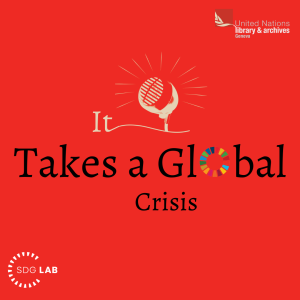
Friday Feb 04, 2022
It Takes a Global Crisis: Episode 2 - Environment and Social Resilience
Friday Feb 04, 2022
Friday Feb 04, 2022
Welcome to Episode 2 of 'It Takes a Global Crisis', a series of four special episodes produced by the UN Library & Archives Geneva in collaboration with the SDG Lab. In this episode we look at the environment and social resilience.
We're joined by David Smith, Chief Economist and Regional Coordinator of UNDP-UNEP Poverty-Environment Action for the SDGs (PEA), UNEP Africa Office, and Akanksha Khatri, Head of the Nature Action Agenda, World Economic Forum (WEF). Together with host Edward Mishaud, they explore how COVID-19 has shed new light on our understanding of society's critical link with the environment. They discuss the link between economic growth and environmental sustainability, and what needs to change to meet the Sustainable Development Goals.
So, did it take a global crisis to realize our own health is linked to the health of our planet?
Let's find out.
Resources
Transcript: The Next Page - Transcripts - Audio Guide - Research Guides at United Nations Library & Archives Geneva (unog.ch)
Find out more about David Smith, Chief Economist and Regional Coordinator for the UNDP-UNEP Poverty-Environment Action for the SDGs (PEA), UNEP Africa Office: Click here.
Find out more about Akanksha Khatri, Head of the Nature Action Agenda, World Economic Forum (WEF): Click here.
Find out more about the UNDP-UNEP Poverty-Environment Action for the SDGs (PEA): Click here.
The UpLink: https://uplink.weforum.org/uplink/s/
1 Trillion Trees - 1t.org: https://www.1t.org/
Global Risks Report: https://www.weforum.org/global-risks/reports
100 million farmers: 100 Million Farmers | World Economic Forum (weforum.org)
Where to listen to this episode
Apple podcasts: https://podcasts.apple.com/us/podcast/the-next-page/id1469021154
Spotify: https://open.spotify.com/show/10fp8ROoVdve0el88KyFLy
Youtube: https://youtu.be/32QMmWjSHg4
UN Library & Archives
Facebook: https://www.facebook.com/UNOGLibrary
Twitter: https://twitter.com/UNOGLibrary
SDG Lab
Twitter: https://twitter.com/SDGLab
LinkedIn: https://www.linkedin.com/company/sdg-lab/
SDG Lab website: About SDG Lab — SDG Lab
Content
Speakers: David Smith and Akanksha Khatri
Host: Edward Mishaud
Editors: Tiffany Verga & Yunshi (Daisy) Liang
Social Media: Natalie Alexander & Marlène Borlant
Production: Natalie Alexander, Edward Mishaud, Marlène Borlant, Evgeniya Altukhova & Tiffany Verga, Yunshi (Daisy) Liang.
Recorded & produced at the United Nations Library & Archives Geneva in collaboration with the SDG Lab.
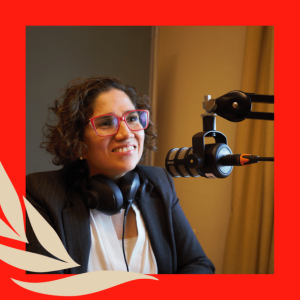
Friday Jan 21, 2022
Friday Jan 21, 2022
Happy New Year from the UN Library & Archives Geneva!
This episode continues our conversations with Ambassadors to the UN in Geneva. Our Director, Francesco Pisano, is joined by the Permanent Representative of Costa Rica to the UN Geneva, Catalina Devandas Aguilar, who arrived in Geneva in late 2020.
She takes us on a fascinating exploration of the history of Costa Rica, its role in the region, and some of its main priorities today that can be examples for the rest of the world, from migration solutions to social protection, green policies and biodiversity, women’s participation, human rights and peace.
And, as one of a small number of countries without a standing army, she shares her assessment of Costa Rica’s experience at the UN today, and how the country’s commitment to peace influences its views on multilateralism and collective security.
Resources
Transcript: The Next Page - Transcripts - Audio Guide - Research Guides at United Nations Library & Archives Geneva (unog.ch)
Follow Ambassador Devandas Aguilar on Twitter: https://twitter.com/CataDevandas
Follow the Permanent Mission of Costa Rica to the UN Geneva on Twitter: https://twitter.com/CRONUGVA
Where to listen to this episode
Apple podcasts: https://podcasts.apple.com/us/podcast/the-next-page/id1469021154
Spotify: https://open.spotify.com/show/10fp8ROoVdve0el88KyFLy
Youtube: https://youtu.be/wUdt7ziY0V0
Content
Speakers: Ambassador Catalina Devandas Aguilar, Francesco Pisano
Host: Tiffany Verga
Editor & Producer: Natalie Alexander
Social media designs: Natalie Alexander
Recorded & produced at the United Nations Library & Archives Geneva

The #NextPagePod
Are you curious about the power of international cooperation? And how it affects our future? Then tune in to the #NextPagePod, the podcast designed to advance the conversation on multilateralism!
Each episode delves into global issues through a multilateral lens, exploring how collaboration across disciplines can facilitate reaching common goals.
Produced at the United Nations Library & Archives Geneva
Editorial Team:
Editor & Coordinator - Amy Smith
Hosts: Francesco Pisano, Natalie Alexander, Amy Smith, Blandine Blukacz-Louisfert, Hermine Diebolt.
Podcast logo and designs - Natalie Alexander, Amy Smith.





